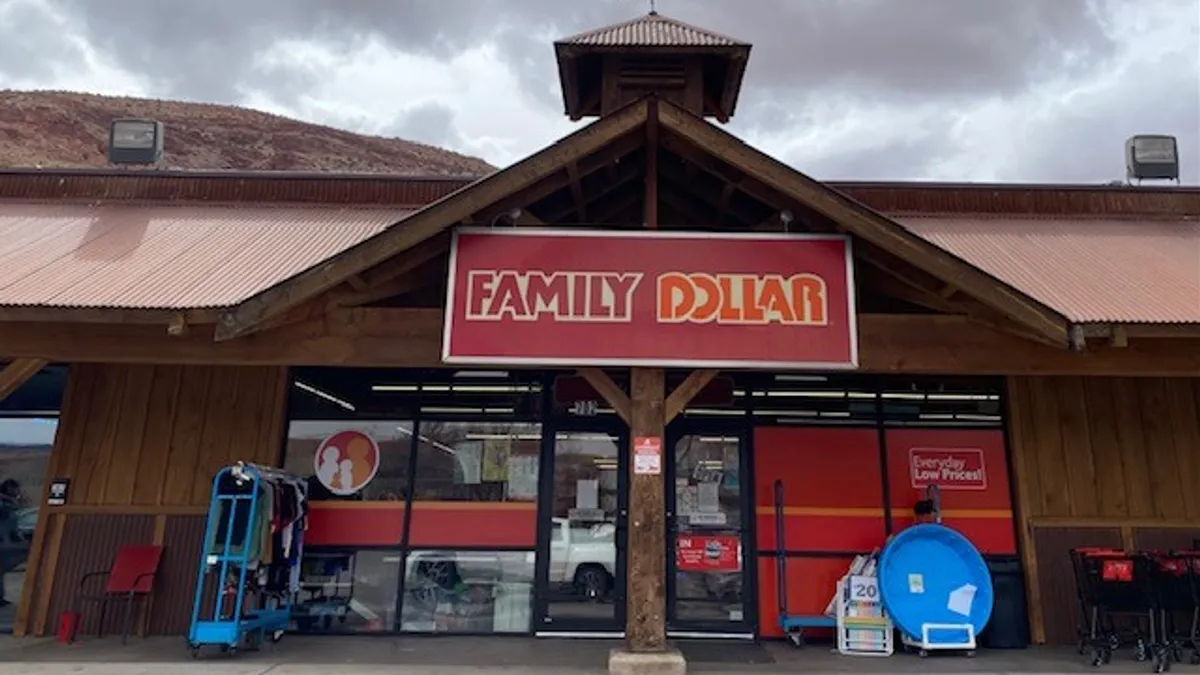Dive Brief:
- Dollar Tree Inc. could sell or spin off its struggling Family Dollar segment as part of a formal review of strategic alternatives, the company announced Wednesday.
- “The unique needs of each banner at this time – transformation at Family Dollar and growth acceleration at Dollar Tree – lead us to the decision to conduct a thorough review of strategic alternatives for the Family Dollar business,” Chairman and CEO Rick Dreiling said in a statement. “Our goal is to position both the Dollar Tree and Family Dollar banners to progress further and faster, and to determine whether the exclusive attention of a dedicated team will benefit both, while creating value for Dollar Tree shareholders and other stakeholders.”
- The company hasn’t set a deadline to complete the strategic review, and a sale or spinoff isn’t certain. The news came as the retailer reported Q1 earnings, with net sales rising 4.2% to $7.6 billion, and net income staying roughly flat. Overall same-store sales were up 1%, Family Dollar’s comps were nearly flat and Dollar Tree saw same-store sales up 1.7%.
Dive Insight:
Dollar Tree is considering a sale of its underperforming Family Dollar segment just months after the company said it planned to close nearly 1,000 of the banner’s stores.
“We have been on a multiyear journey to transform this organization and fully unlock its intrinsic value,” Dreiling said on a call with analysts Wednesday. “An important step in this process was our portfolio review and the decision to close 970 underperforming Family Dollar stores. Many of these stores had been underinvested in for years and the capital investment required to fix them could not deliver an acceptable rate of return.”
While that could accelerate a turnaround, the challenges with Family Dollar are occurring at the same time that the company is “aggressively” growing its Dollar Tree banner, which he said is one reason for potentially separating the two retailers. The company is expanding Dollar Tree’s multiprice point offering and accelerating new store openings for the banner. It plans to add 300 more items beyond its $1.25 price point in about 3,000 Dollar Tree stores by the end of this year and it plans to convert up to 170 former 99 Cents Only locations to Dollar Tree stores. It bought the rival retailer’s intellectual property in a bankruptcy deal last month.
Neil Saunders, managing director of Global Data, said in emailed comments that Family Dollar faces several issues. They include the loss of market share to rivals because of the retailer’s weak value proposition. Profit performance, too, is weak. And Saunders said, Family Dollar stores are in locations where it’s easy to buy from a competitor.
“The key questions are what valuation Family Dollar might attract and who might want to buy the business,” Saunders said. “The answer to the former is that Dollar Tree would get nowhere near the $8.5 billion it originally paid. It is clear to all in the market that Family Dollar is a chain that needs a lot of work and investment, a fact which will also thin out the number of interested parties. A spin-off into a separate entity may be an easier option although, again, Dollar Tree will likely take a loss on the original purchase price.”
In response to an analyst’s question during the call, Dreiling said it’s too soon to say what the company might do if it's unable to sell Family Dollar. Dreiling said while some human resources and legal functions are intertwined, the banners’ supply chain, merchandising and retail are mostly separate.
Family Dollar “is a large financial overhang” for Dollar Tree and has clouded the company’s value, Wells Fargo analysts led by Edward Kelly said in a note. “Many will question if there is a buyer, but we see at least some value here. The most likely scenario may still be the convert/sale/wind down option.”
Dollar Tree said it had already closed 550 stores as part of its previously announced portfolio review and plans to close an additional 150 stores by the end of the fiscal year. As of May 4, the company said it operated 16,397 stores across 48 states and five Canadian provinces.
“[Family Dollar] has been a disappointment, but we do not see this asset as part of the future of [Dollar Tree] and the pursuit of strategic alternatives looks like a catalyst to unlock value,” Kelly said.















